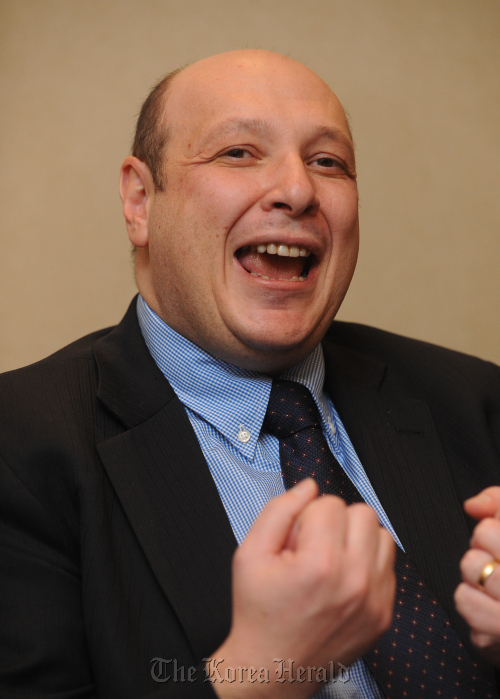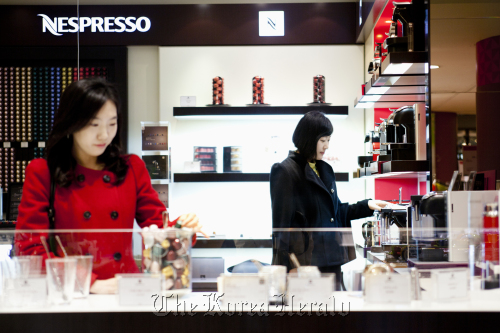Nespresso is confident that booming enthusiasm for coffee among Koreans and the surging popularity of homemade espressos will continue to shore up its brisk sales growth in the market, the chief of Korean operations said.
Since the coffee business unit of Swiss food giant Nestle launched its single-serve “coffee capsules” in December 2007, it has led the local portion coffee market which has been expanding by around 30 percent every year, one of the fastest rates in the world.
“Growth we’ve been experiencing in Korea has been tremendous, far in excess of initial expectations and the espresso segment’s global average growth,” said Ross Gatta, Nespresso Korea country manager.
 |
Nespresso Korea country manager Ross Gatta (Lee Sang-sub/The Korea Herald) |
“We’re pioneering a new category here by building awareness of our brand and system. But the speed at which we’ve been doing that and Korean consumers are buying into the Nespresso brand is really fantastic.”
An Italian-born Australian, Gatta has traveled from Australia to Japan to Hong Kong in his career at Nestle since 1998.
It was his “espresso fanaticism” that carried him into the portion coffee business, said Gatta, who has been a Nespresso user himself for more than 10 years.
“Good coffee has a story to tell,” Gatta said. “Once you drink it, the story is all about where it comes from, how its beans have been cultivated, matured, roasted and blended. I love coffee because it tells you the story.”
Nestle’s fresh concept of tamping coffee grounds in airtight aluminum capsules was devised to “create perfect espresso conveniently and consistently at home.”
Customers can get a cup of espresso in less than a minute with just one push of a button. Popping a pod into a specially designed machine, the right amount of compressed air and water is automatically calculated to extract the freshest drink possible.
As of 2010, 12,300 cups of Nespresso coffee were consumed every minute around the globe, a 14-fold increase compared with 868 in 2000, according to the company.
In the global coffee market, shares of the single-serve coffee segment rose to 8 percent in size and to 25 percent in value between 2000 and 2010, according to research firm AC Nielson.
If this trend continues, the figure could go up to 12 to 15 percent by 2015, Gatta said.
“We revolutionized the way millions of people around the world enjoy espresso and helped shape the global coffee culture,” he said.
 |
Shoppers look around Nespresso’s products at its boutique at Lotte Department Store’s main branch in downtown Seoul. (Nepresso Korea) |
Nespresso has made inroads into more than 50 countries. In Korea, it operates 11 boutiques at branches of Lotte Department Store and Hyundai Department Store.
Global sales grew at an annual rate of 20 percent, topping $3.5 billion last year, company figures showed.
Lotte Department Store saw combined sales of its six Nespresso shops go up about 20 percent from a year earlier, the company said.
Korea is one of the fastest-booming portion coffee markets alongside Brazil, Australia and Denmark, and is already the second-biggest in Asia after Japan, Gatta noted.
“Coffee is in the lifeblood of Koreans,” Gatta said. “What struck me was there was no run-out of coffee here. In Seoul, you go to a subway, you can smell coffee beans brewing somewhere in the station. You walk down the street, and there is a coffee shop at every corner. On major roads, there are probably six or seven next to each other. At convenient stores, you can even buy a coffee gum. It’s all coffee culture.”
Currently, the eight largest coffee shop chain operators together run more than 20,000 branches nationwide. They include Starbucks, Coffee Bean, Caf Pascucci, Caffe Bene, Hollys, Angel-in-us and Tom N Toms.
The ever-expanding local coffee industry also gave a boost to the capsule business.
The fledgling sector accounts for about 9 percent of the 1.1-trillion won ($1.02 billion) Korean coffee market right now, but its slice is likely to get bigger in the coming years given its rapid pace of growth and intensifying competition.
Other than Nespresso, at least seven different brands of coffee pods and machines are available here from Coffee Bean Korea, Caf Italico, Electrolux, De’Longhi, Lavazza, Philips and illy.
Yet, Gatta is in no doubt that Nespresso will remain supreme.
“The segment is booming very fast, so it’s only natural that the market attracts other participants,” he said.
“It’s Nespresso that revolutionized the coffee culture. We are the leader and will continue to be the leader.”
Nespresso delivers an ultimate coffee experience through finest-quality beans, smart and easy-to-use machines and 24-hour call center service, he added.
“We call it the ‘Nespresso trilogy.’” Gatta said. “This has been the center of our global success in the past, and will continue to be.”
Its widening customer base, powered by the rising number of coffee lovers, will help secure a firm foothold in the Korean market, he noted.
“We have a very broad customer target ― those who have passion for coffee,” Gatta said. “We found Koreans very discerning when it comes to coffee. And they really appreciate high-quality coffee.”
Gatta is pinning high hopes on the company’s latest model named Pixie this year as a growth engine.
“Pixie is the smallest, lightest and fastest machine in our range,” he said. “It minimizes space, time and energy to extract a cup of coffee, without sacrificing or compromising the espresso system inside.”
Weighing merely 2.8 kilograms, the device only takes 25 seconds to heat up and has an auto-shutoff function, which saves 40 percent in energy compared with other models.
“We’re excited about Pixie because it meets Korean consumers’ needs, wants and demand,” Gatta said.
“We have big ambitions in Korea. Our immediate focus is to continue to improve espresso customers’ experiences by providing more services, building on the availability of our machines in the marketplace and continuing to build awareness of the Nespresso brand and espresso system.”
By Shin Hyon-hee (
heeshin@heraldcorp.com)









